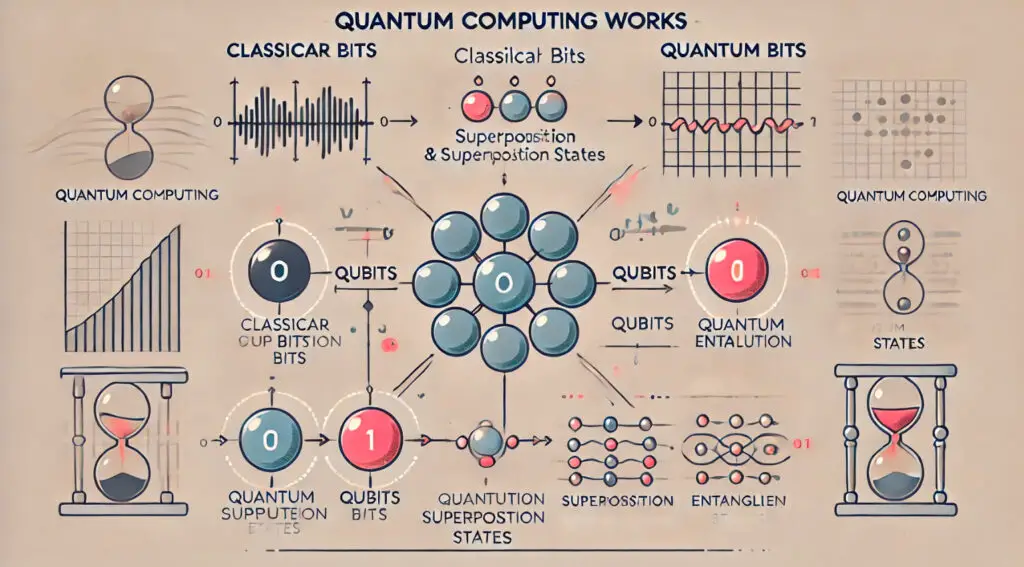
Quantum computing sounds like a concept straight out of science fiction, but it’s rapidly becoming a part of our present-day reality. Imagine a computer so powerful that it can solve problems in seconds that would take today’s best supercomputers thousands of years. That’s quantum computing for you. In this blog post, we’ll break down what quantum computing is, how it works, and how it could change our everyday lives. We’ll also explore the history of this groundbreaking technology, examples of quantum computing in action, and how you can get involved in this exciting field. Let’s dive in!
What Is Quantum Computing?
To understand quantum computing, let’s first look at how regular computers (called classical computers) work. Classical computers, like your smartphone or laptop, process information in bits. A bit can be a 0 or a 1—essentially, an “on” or “off” switch. Everything your computer does, from sending an email to streaming a movie, is based on combinations of these bits.
Quantum computers, on the other hand, use qubits (short for quantum bits). The magic of qubits is that they can exist in multiple states at once, thanks to a phenomenon called superposition. Imagine flipping a coin that doesn’t land on heads or tails but exists as both at the same time. This allows quantum computers to process a vast amount of information simultaneously.
Another important concept in quantum computing is entanglement. When two qubits become entangled, the state of one directly influences the other, no matter how far apart they are. This creates incredible opportunities for solving complex problems with unmatched speed and accuracy.

A Brief History of Quantum Computing
The idea of quantum computing has been around since the early 1980s, when physicist Richard Feynman proposed using quantum mechanics to simulate complex physical systems. In 1994, mathematician Peter Shor developed a quantum algorithm that could theoretically break widely used encryption systems—a revelation that underscored the potential power of quantum computers.
Fast-forward to today, and companies like IBM, Google, and Microsoft are racing to build scalable quantum computers. In 2019, Google claimed “quantum supremacy,” demonstrating that its quantum computer solved a problem in 200 seconds that would have taken a classical supercomputer 10,000 years. While we’re still in the early stages, the pace of innovation is accelerating, bringing quantum computing closer to practical applications.
How Will Quantum Computing Change Your Life?
Quantum computing isn’t just for scientists or tech giants—it has the potential to transform everyday life. Here are some exciting ways it could impact you:
1. Revolutionizing Medicine
Quantum computers could help researchers design new drugs and treatments by simulating complex molecules and biological systems. Instead of relying on trial and error, scientists could pinpoint effective treatments faster, leading to cures for diseases like cancer or Alzheimer’s.
Example: Biotech company ProteinQure is using quantum computing to develop protein-based drugs.
2. Faster, Smarter Artificial Intelligence (AI)
AI systems rely on massive datasets to learn and improve. Quantum computers can process these datasets exponentially faster, making AI systems more powerful and efficient. Imagine smarter personal assistants, improved voice recognition, and more accurate predictive models for everything from weather forecasting to financial planning.
Example: Volkswagen is using quantum computers to optimize traffic flow in cities, reducing congestion and cutting down commute times.
3. Stronger Cybersecurity
Quantum computers could break current encryption methods, but they also hold the key to developing unhackable quantum encryption systems. This would ensure safer online transactions and better protection against cyberattacks.
4. Transforming Logistics and Travel
Quantum computing can optimize complex systems like supply chains and traffic networks. For instance, airlines could schedule flights more efficiently, reducing delays and cutting costs.
Example: DHL and FedEx are exploring quantum solutions to improve package delivery routes and times.
5. Solving Climate Change
Quantum simulations could help us better understand climate systems and develop more efficient materials for renewable energy, such as solar panels and batteries.
Example: IBM is working on quantum algorithms to improve carbon capture technologies.

Quantum Computing Technologies: What’s Rising?
Several key players and technologies are driving the quantum computing revolution.
1. IBM Quantum
IBM is a pioneer in quantum computing, offering cloud access to its quantum computers through IBM Quantum Experience. Developers and researchers can experiment with quantum algorithms and learn about the technology hands-on.
2. Google’s Sycamore
Google’s Sycamore quantum processor achieved quantum supremacy in 2019. The company continues to push the boundaries of what quantum computing can achieve.
3. Rigetti Computing
This startup is focusing on hybrid quantum-classical computing, combining the strengths of both systems to tackle real-world problems.
4. D-Wave Systems
D-Wave specializes in quantum annealing, a specific type of quantum computing used for optimization problems like route planning and scheduling.

How Does It Work? A Simple Example
Let’s say you’re trying to find the fastest route from your home to work, but there are millions of possible routes. A classical computer would test each route one by one until it finds the best option. A quantum computer, however, could analyze all possible routes simultaneously, thanks to superposition. It’s like having a supercharged GPS that instantly finds the perfect path.
How Can You Get Involved in Quantum Computing?

You don’t have to be a physicist or computer scientist to start exploring quantum computing. Here are some accessible ways to dive in:
1. Learn Online
Many free resources and courses can help you understand quantum computing basics, even if you have no technical background. For example:
- IBM Quantum Experience: IBM offers free tutorials and cloud access to quantum computers. You can try out simple experiments and learn quantum programming with their easy-to-use platform.
- Qiskit: IBM’s Qiskit is an open-source quantum computing framework that provides coding exercises and a beginner-friendly learning path.
- Quantum Country: This online resource provides engaging articles and visualizations to help you grasp quantum concepts.
2. Join a Community
Engaging with others interested in quantum computing can accelerate your learning. Check out forums, online groups, and meetups like:
- Quantum Open Source Foundation (QOSF): A global community supporting open collaboration in quantum research and education.
- Reddit’s r/QuantumComputing: A vibrant community for discussing quantum news, ideas, and projects.
3. Experiment with Tools
You don’t need a quantum computer at home to start experimenting. Companies like IBM and Microsoft offer cloud-based quantum platforms, allowing you to code and test simple quantum algorithms right from your laptop.
4. Pursue Education and Certification
If you’re serious about diving deeper, look into certification programs and quantum-focused degrees. For instance:
- IBM’s Quantum Developer Certification helps establish foundational skills.
- Universities like MIT and Stanford now offer courses specifically in quantum computing.
Conclusion
Quantum computing is poised to revolutionize the way we solve problems, unlocking possibilities that were once unimaginable. Whether it’s advancing healthcare, improving AI, or fighting climate change, the potential applications are endless.
And the best part? You don’t need a Ph.D. to be a part of this journey. Whether you’re learning from online tutorials, coding your first quantum algorithm, or simply staying curious, there’s a place for everyone in the quantum computing revolution.
The future is quantum, and it’s not as far away as you might think. So why not take the first step today? Who knows—you might just help solve the next big problem!
Share Your Thoughts!
What do you think about quantum computing? Does it sound exciting or intimidating? How do you see it shaping our future?
We’d love to hear your thoughts! Drop a comment below to share your ideas, questions, or experiences with quantum computing. Let’s keep the conversation going and explore this fascinating topic together.
